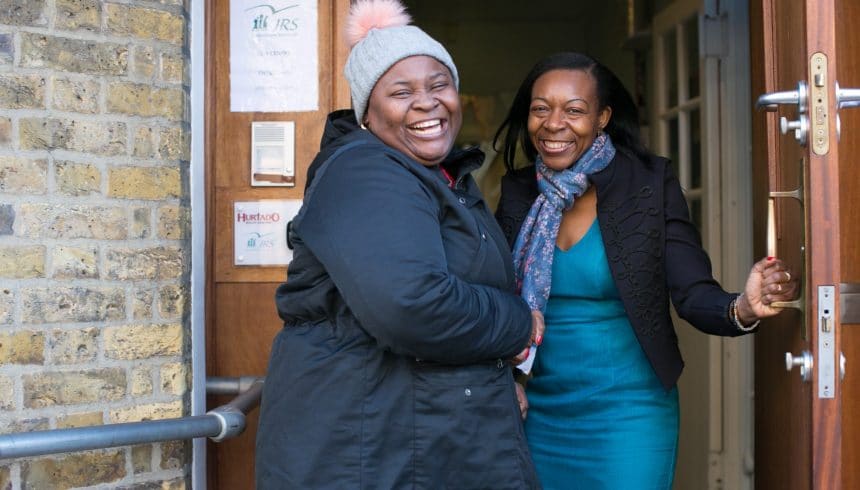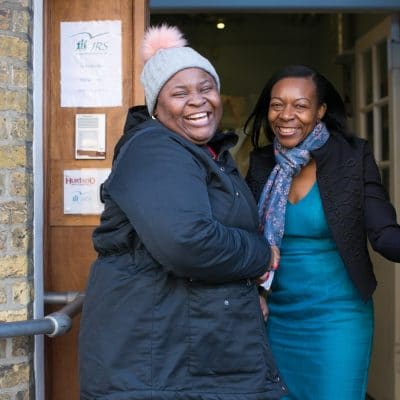For our welfare and not for our harm is not an easy report to read. New research by Dr Anna Rowlands is closely based on detailed interviews with destitute people seeking asylum. These are all people whom we, at JRS UK, accompany through our day centre in Wapping, and (although interviewees remain anonymous), they are known to me personally. This report honestly recounts their experiences of the asylum system, and of detention and destitution that are embedded in frequently enforced unjust decisions.
Refugee interviewees have lived in destitution for years, struggling to get by and vulnerable to exploitation and abuse. Many of them have also been detained – torn from communities and a life that they have worked so hard to build against the odds, and are indefinitely incarcerated in prison-like conditions; perpetually afraid of being forced onto a plane and back to a country where they fear for their lives.
The report reveals how subjection to these experiences distorts human dignity. Reflections on the asylum determination system speaks to its utter lack of engagement with those whom it makes life and death decisions on: “it’s like talking to a machine…People are just numbers.” Regarding destitution, someone remarked: “Living on charity makes you feel worthless,” and on enforced idleness and marginalisation, one said: “intellectually you suffer and die because you can’t engage, participate, or contribute.” With reference to indefinite detention, someone told Dr Rowlands they had been “destroyed by [their] own trauma.” As the report observes, detention impacts the whole person, forever.
Read More & Download the Report
The permanence of the harm done by the asylum system struck me most in the accounts relating to time. Both through the prolonged waiting in destitution and through indefinite detention, time is wasted and taken, permanently. It cannot be reclaimed. It must be mourned. And yet this is not a tale of unremitting misery. Somehow, against the odds, people also tell of spaces within and beyond this, in which they have recovered and renewed themselves. In an interview quoted at length in the report, one man explains that, when encountering faith in detention, “I realised I had love in me.” Through this, he seeks to “reach out” to others and hopes for a “legacy of love.” By contrast, and in fact, “Detention is not a context of love.” In the face of this context, in defiance of it, he has found a way to be loving anyway.
“Faith gives perseverance and determination. It’s like glasses or goggles; you see the world differently.”
Quote from an interviewee
This theme of thwarted love signals a desire that recurs elsewhere in the report. One woman told Dr Rowlands: “The system shapes your life as a woman in such a way that it means you live your life with no love, no life, and no stability for a relationship that is good.” Conversely, a refugee volunteer explained: “coming here uses skills that I developed in my country of origin – it’s a way to console and give hope to people. It makes me feel happy, like I am someone who can also do something good for someone. For myself I have gained love.” JRS might be seen as a context of love, very unlike detention. And if it is so, this is partly because it is, in this case, a context where people can participate, can do good, can reclaim and remake their dignity. Amid a hostile landscape, a space that suffocates and stifles love, love was found and forged through praxis.
‘For our welfare and not for our harm,’ comes from the Book of Jeremiah and within the report, interviewees explained that this had been incredibly poignant to them. There is a longing for a system that is for welfare, not for harm. And the desire for community, for relationship, for love, cannot be completely separated from this desire for systemic transformation.
This research confronts us with systemic violence against the human person. It shows how the distortion of human dignity is embedded within our asylum processes. It obliges us to confront that violence, to grieve over it, and to challenge it. And amidst this grief and anger, here are human lives living in search for something better; here are voices calling for a system that creates room for love and can be trusted with human dignity.
Read how the report reflects the reciprocal nature of accompaniment here at JRS



